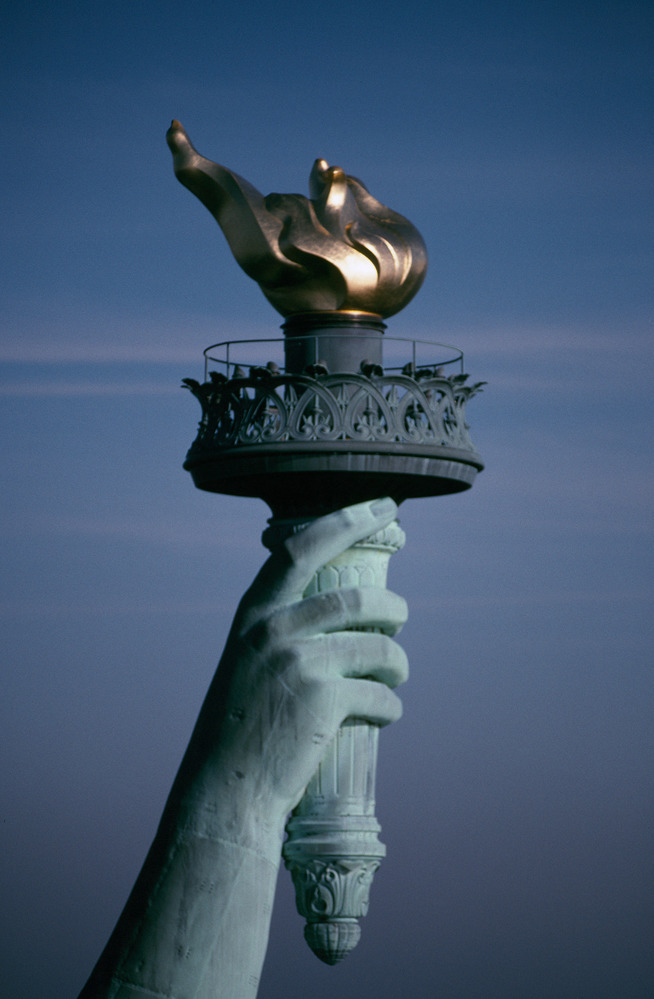Before I delve into the essence of this article, let me clarify one point for any potential Trump supporters reading this: No, I do not think Hillary Clinton is the perfect presidential candidate. But I also do not think she is “crooked Hillary,” whatever Donald Trump means by that, nor do I think she is so terrible as to be unacceptable. She has a number of admirable qualities balanced by some noticeable drawbacks, and she is and has been a very serious student of public policy. She is qualified and experienced. That is offset to some degree by some noticeable shortcomings, although the office of President of the United States has almost never been a denizen of saints. She is certainly not a threat to democracy or the democratic process, nor is President Barack Obama, despite right-wing attempts to demonize him. I can think of many presidents of both parties with whom I disagreed on specific policies without worrying about whether they jeopardized the future of the republic.
All that said, I do think Donald Trump has crossed numerous red lines that others before him have, out of principle and concern for the nation, chosen not to cross, which is why previous Republican nominees and presidents—the Bushes, John McCain, and Mitt Romney—have either rebuked his candidacy or repeatedly clashed with him. Two are of special concern.
First, the threat to jail his opponent, following up the litany at the Republican National Convention of “Lock her up!” regarding Hillary Clinton, shows a shocking disregard of the constitutional limits of the presidency. There is a reason no presidential candidate has made such a threat before, and it is not that no one was as crooked as Hillary. It is that it is not the job of the President to decide who is arrested, who is indicted, and who goes to prison. It is the job of the courts and law enforcement agencies, including the U.S. Department of Justice, to make that call. With regard to Clinton’s e-mails, James Comey, the director of the Federal Bureau of Investigation (FBI) and a Republican, has made the determination there was carelessness but not a crime, but it appears that Trump and his supporters will be satisfied only when they get the outcome they want. This weekend’s revelation that the FBI will examine the Clinton-related e-mails (which apparently were not to or from Clinton herself) found on a computer belonging to former U.S. Rep. Anthony Weiner and his estranged wife, Huma Abedin, a Clinton aide, has added no real substance to any accusations, Donald Trump’s hyperbolic implications notwithstanding. Trump himself is not entirely immune to prosecution on certain fronts, but it will not be Clinton who forces the issue. It will be the justice system at some level that will decide whether any charges have sufficient merit to justify such steps. Clinton knows far better than to wade into such a swamp even for political purposes.
What Trump’s rhetoric does, however, is dramatically reduce any apparent distance between the constitutional procedures at work in the United States and the more capricious workings of justice in authoritarian nations like Russia or Venezuela. That is a step into the abyss that should alarm any thinking, conscientious American. I say “apparent” because, while I absolutely believe the substantive differences between our political system and those in such nations is very real, Trump is erasing some of the appearance, and perceptions matter.
Second, the claims of a rigged election are despicable and based on nothing. Trump has offered no proof because there is none. Not only are there numerous studies, all cited repeatedly by the news media, showing only infinitesimal vote fraud at a level that would not even affect most municipal elections, let alone the presidency, but our electoral system itself is geared to prevent it. There is no national election system in the U.S. Elections are under the control of state-level Secretaries of State, for the most part, most of whom right now are Republicans. Why would Republican election officials be assisting a conspiracy to keep Donald Trump out of office? In any event, even they lack that power because the administration of elections is generally handled at the county level. The system is thoroughly decentralized. Both parties have long had poll watchers who monitor activity at polling places and can blow the whistle when something is awry. The number of people who would need to be party to a conspiracy in order to rig a national election successfully is so vast as to be laughable. My wife has been an election judge for Cook County. There are strict incentives for accuracy for poll workers on Election Day. The county clerk, David Orr, is a thoroughly honorable man who enjoys great respect.
It is important to recognize, however, that Trump’s allegations of a rigged election are not about the election. They are the desperate efforts of a man who has derided others as losers to deflect attention from the fact that his own inept campaign, hobbled by his own deep character flaws, has turned him into a seeming loser in a campaign he thought he could not lose. Unable to handle or accept responsibility for possible defeat, Trump is driven to find some cause outside himself to blame for it. The problem can never be Trump himself. If he is going down, he will try to take the system down with him. The problem is that he has too many followers willing to follow him into that abyss.
There are other characteristics of Trump that raise serious questions. His thin skin for criticism, which causes him to lash out, has made many people very uneasy with his candidacy. His behavior too closely resembles that of a schoolyard bully who has never matured or moved beyond a brand of egotistical narcissism that is deeply troubling. More experienced politicians with a better perspective on what matters, for instance, would easily have decided that Gold Star parents, through the loss of their child in this nation’s service, have earned the right to express their opinions and that it would be best to simply respect their feelings. Ohio Gov. John Kasich has said as much. But most other candidates would also have had more restraint—and respect for the U.S. Constitution—than to have made the comments about Muslim citizens that provoked the Khans’ objections to Trump in the first place. In the view of a bully, however, such criticism is intolerable and must be squashed.
I also must say that Trump violates one of my own fundamental values—my appreciation for factual accuracy and scholarship. I understand that almost no politician is likely to be entirely truthful 100 percent of the time, in part because no one lasts very long that way. But on the spectrum of perfect honesty versus indifference to the truth, Trump veers so far toward indifference that he has scared the wits out of many Americans who care about honesty. When I hear anyone, politician or otherwise, use hyperbolic rhetoric with words like “huge,” “everyone says,” “so many people tell me,” etc., I begin to cringe with a sense that the speaker is almost immune to the influence of serious information. As a writer and communicator, I understand the need to digest and focus and condense information for popular consumption, but this type of rhetoric is not about that. It is about disguising the speaker’s lack of commitment to learning and to understanding the importance of knowing what you do not know. When absorbing technical information outside my area of expertise, I may well ask an engineer or scientist to concentrate on the essentials without burying me in minutiae, but I still care about the accuracy of what I am learning. And I have learned, sometimes the hard way over the years, that the catch phrases I have cited above are typically those of a bullshit artist. This same reaction is undoubtedly what led CNN journalist Fareed Zakaria earlier this summer to publish his daring op-ed in the Washington Post, “The Unbearable Stench of Donald Trump’s B.S.”
Is there any precedent for such a candidate? I think there is, but not where people have been looking. I have heard some comparisons to Mussolini or Hitler, and at one point wondered whether the former was an apt comparison. I think not. For one thing, despite his troubling rhetoric, Trump lacks the discipline both in his campaign and among his followers to imitate these fascist leaders. Fortunately, we see no brownshirts, no jackboots, not even a clear ideology. There is merely a campaign based on numerous grievances, some more legitimate than others, among a portion of the electorate that is hungry for a strong leader who they believe can “make America great again.” He is certainly firing up their fears and paranoia, and that may have some lasting consequences for both the nation and the Republican party. But it simply is not the same thing. Let’s dispense with that sort of hyperbole from the left.
Nor, despite Trump’s apparent admiration, is Russian President Vladimir Putin a valid comparison. Russians at the moment appear to prefer Putin’s strong, silent type of leadership over the brash, talkative role model that Trump embodies.
Instead, I would suggest that the real comparison lies south of the border, in the very nations that are supplying so many of the immigrants that Trump promises to wall out of the U.S. There has long been a style of Latin American politics known as “personalismo” in Spanish, for which there is not a direct translation in English, although “personalism” would be the apparent operative term. Personalismo is built around the messianic appeal of a charismatic leader who basically proclaims, as Trump famously did in the Republican convention this year, “I alone can fix it.” The appeal typically resonates with people who have grown deeply skeptical of the political system and its ability to solve deeply rooted problems. Examples could include Juan Peron in Argentina, and perhaps Eva Peron later as well, Hugo Chavez in Venezuela, Omar Torrijos in Panama, and Alberto Fujimori in Peru. One might even add the current example of President Rodrigo Duterte in the Philippines. These leaders are quite distinct from leaders of the once frequent military juntas in Latin America, who were often distinctly uncharismatic and relied on guns, not votes, for their rise to power. Personalismo produces leaders who rise as a result of a rapid surge in popularity built upon rhetoric often eerily similar to “make America great again,” such as Chavez’s “Bolivarian revolution” or promises to wipe out crime and rebellion through strong-arm tactics. Personalist leaders often acquire military support, but it is not at the root of their popularity.
The problem is that such exercises in messianic leadership almost never end well. In fact, they almost always end badly and do little to strengthen democracy. If there are rigged elections, they almost invariably happen not in the rise to power, but as el lider’s popularity eventually declines and a need emerges to find ways to prolong his reign. This is largely the route being followed now by the remnants of Chavismo under the far less charismatic successor, current Venezuelan President Nicolas Maduro. Losing power is tough to tolerate for a politician who rode to power on a wave of populist enthusiasm. However, as I noted earlier, the U.S. electoral system is loaded with safeguards against such an outcome precisely because it is federal and widely decentralized. Political systems in most Latin American nations have traditionally been more centralized at a national level.
Where does that leave us? The rise of a candidate like Trump, for one thing, does serve a purpose. It exposes the fact that a substantial portion of the U.S. electorate feels disenfranchised and disempowered at some significant level. While many are grasping at straws in embracing Trump as a problem solver, this does not mean the problems should be ignored. The loss of blue-collar jobs creates serious issues of social equity, and the rise of the Bernie Sanders candidacy in the Democratic party should have alerted Clinton to the fact that her presidency may face serious obstacles to success if she does not address them. Clinton could blunt the power of Trump’s following by finding ways to effectively handle the displacement of jobs in mining and manufacturing, but it will take a more deliberate effort than we have seen so far. Communities in places like Kentucky, West Virginia, and Ohio that have flocked to the Trump candidacy will be hard sells for such programs, yet no president—not even Trump if he is elected—is likely to reverse the long-term decline of coal, or the widespread systemic changes in the steel industry. Some communities will have to be helped to embrace a more promising future. But many of these workers have been offered little hope for a long time, and they are understandably frustrated. There are opportunities to address that frustration, however, and failure to do so will only breed more of the same cynicism that brought us to our current choices. What remains to be seen, if she is elected on November 8, is whether a President Hillary Clinton (or, for that matter, Donald Trump) has the capacity to be bold enough, and courageous enough, to confront this gap between reality and aspiration in a bid to erode such cynicism. And whether Republicans in Congress will help lead, get out of the way, or obstruct progress.
Jim Schwab



